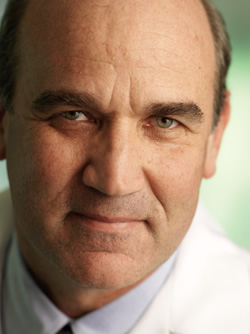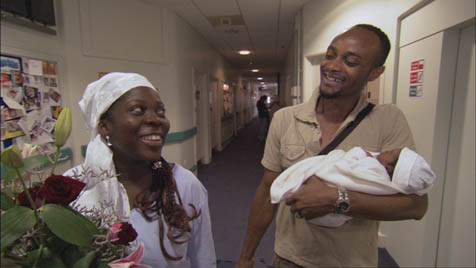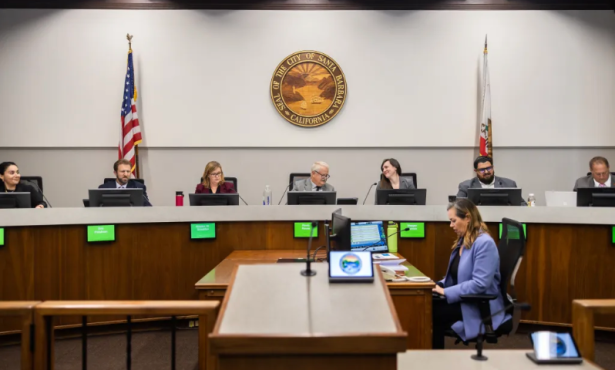Santa Barbara’s Healthcare Heavies Weigh in on SiCKO
Terminal or Treatable?

Michael Moore’s documentary SiCKO brings an ounce of glitz to a subject many people find only slightly more fascinating than peeling potatoes-healthcare. For a reporter on this beat, it’s welcome relief from the same old statistics on the uninsured. So when it was released in theaters on June 29, I wanted to celebrate it journalistically.
But how? The best suggestion came from an editor: invite two of Santa Barbara’s most influential healthcare leaders to see it with you, he said. I picked Ron Werft, president and CEO of our three-hospital monopoly, Cottage Health System, and Kurt Ransohoff, MD, president and CEO of Sansum Clinic, the largest medical group in the county. What would they think of Moore’s damning take on our confusing and sometimes even heartless system? I had to find out.
Happily, they accepted my invitation and we all met up outside the Paseo Nuevo movie theater last Friday. SiCKO gets you laughing right away. But underneath the black humor augmented by dippy, singsong music are real and distressing examples of Americans being denied needed care with bad results. With his Joe Blow persona and sarcastic wit, Moore milks every story and then exaggerates the flawlessness of the healthcare systems in other countries. When we left the theater, Werft said he thought SiCKO might be Moore’s best film yet. But, as I learned over coffee, that didn’t mean this tall, good-natured hospital chief-who seems to know everybody in Santa Barbara-thought the movie was a balanced picture of how things work in America.

“The scenarios he portrays absolutely happen here,” Werft said. “In that sense, it’s a fair portrayal of the worst aspects of the U.S. healthcare system.” But, he added, “There is a compassionate side to the healthcare system that goes unreported.” Ransohoff agreed. “He’s not trying to be fair. : That’s not his thing. His thing is to make a point. : It’s an editorial more than a documentary.”
At the beginning of the movie, we hear from an uninsured man who accidentally sawed off the tips of two fingers and discovered it’s going to cost $60,000 to reattach the pointer tip and $12,000 to reattach the ring finger, thus forcing him to choose. Werft found it hard to imagine this happening in an American emergency room. “And it would never happen [here in Santa Barbara],” he said. A heartbreaking story came later from a mother whose four-year-old with a high fever was rushed to an ER in south Los Angeles only to be told that, because she was covered by Kaiser, she would have to be transferred to one of their hospitals. The girl had a seizure in the ambulance while being driven there and died.
“The system is set up so that when a patient shows up in need of emergency care, they are to get emergency care and only after they’re stabilized can they be moved,” Ransohoff said. “Someone at Martin Luther King [Hospital] must have inappropriately assumed she didn’t need emergency care. : But again, Moore’s point is to bring up the issue that the system is so complicated and bogged down in its bureaucracy that bad things can happen, even though the example was more the result of an individual misjudging the situation.”
Moore directs his scorn at both the health insurance and pharmaceutical industries, but mainly the former. Using his many horror stories, he hammers home his belief that a healthcare system powered by profit motives dehumanizes everyone-from health insurance employees down to the taxicab driver who deposits an aging, disoriented homeless woman, still in her hospital gown, on the curb in front of a Los Angeles shelter. I asked my healthcare leaders, who run nonprofit organizations, what they thought.
“Is it ethical for a company or individual to profit by denying appropriate care? Of course not,” Werft said. “And our structures are set up to reward those systems. It’s a real problem.”

Ransohoff agreed. He went on to claim Moore’s depiction of the healthcare systems in England, France, Canada, and Cuba weren’t exactly complete. “At some point, they deny care, too. They have to. It wouldn’t be possible to give everyone whatever they wanted. The difference is the saying no is felt to be a societal necessity as opposed to a profit motive from a for-profit multibillion-dollar corporation.”
In publicizing SiCKO, Moore admitted he wants the movie to push the country closer to a single-payer, government-run plan like the European ones he idealizes. Werft said a lot of providers in this country aren’t all that happy with the part of our system that is already single-payer and government-run-Medicare-because it pays only two-thirds of the actual costs of care given to its beneficiaries. “And so we shift the burden of that loss from the government onto the Blue Crosses, the Aetnas, the private insurers,” Werft said. They then shift it to their employer contracts, which ultimately results in employees paying a larger percentage of their premiums, he said.
Watching SiCKO, it’s easy to lose faith in America’s capacity to change its approach to giving and receiving medical care because its dysfunction is so diffuse. I asked Werft and Ransohoff what kinds of reform state and federal lawmakers should fight for. They looked at their watches and said they had to go. Then we all laughed.
“People need to get much more engaged in the discussion about these issues,” said Ransohoff. Then he added, “I think some sort of system, either single-payer or at least a single standard of benefits, might work.”
“It’s unlikely we’re going to create a U.S. National Health System in the next presidential election,” Werft said. “But I think we should get to an agreed-upon standard benefit package through some kind of financing mechanism that everybody has access to.” He paused, then added, “Because it’s an embarrassment, not as a healthcare executive, but as a resident, an American.”
To read the unedited transcript of this discussion, click here.



